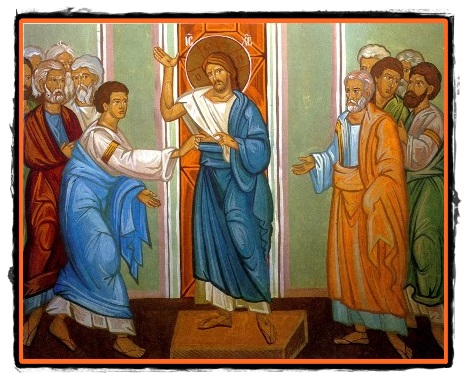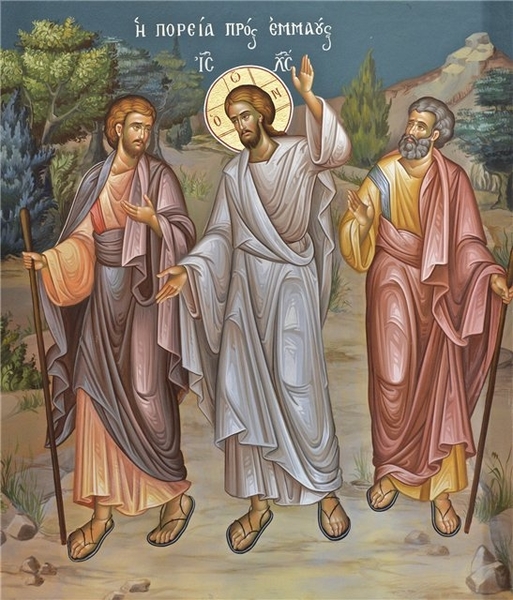Feast of the Resurrection inaugurates Pentecostarion period. With the Resurrection of Christ during the kingdom of God opens for hymns and prayers evoked by the Church. God’s kingdom is the kingdom of the Holy Trinity. The period from Easter to Pentecost, is a revelation of the Trinity upward, constantly highlighting the Trinity, the fundamental doctrine of Christianity professed in the symbol of faith.
 At Easter, the whole creature enjoys Resurrection of Christ who killed his death and reconciled us with the Father, inaugurating the eternal kingdom.
At Easter, the whole creature enjoys Resurrection of Christ who killed his death and reconciled us with the Father, inaugurating the eternal kingdom.
Forty days after Easter, our Savior was taken up, in the bosom of the Father to send him into the world Comforter.
Pentecost is the final term of the Incarnation of economy and head dispensation of the Holy Spirit and Church history. If Easter, Christ appeared to him in light, flame He sends the Spirit on the Apostles congregation. Pentecost is the celebration of the feast of the Trinity and the Church. Inseparable connection between stewardship-anointed Son, and Holy Spirit-anointing stewardship is clearly outlined by sending the Comforter in the world by the Son. The person sits in the center of the feast of the Holy Spirit who reveals the person of the Incarnate Word, which in turn shows the Person of the Father. Son and Spirit are “the two hands of God” as an expression of Irenaeus of Lyon, which s¬a father used to call him the human dignity original to him turns into the kingdom of Trinitarian love. Comforter is that the Church, Christ’s physical absence, ensure the presence of God in the world and gives grace divine, pouring himself as gifts.
Spirituality is Pentecostarion model of divine life, the cosmos is contained in the kingdom of trinitarian love. He lives on earth and in heaven.
To present the fruits of the kingdom, the Church has placed the first Sunday after Pentecost, Feast of All Saints, feast when his mention all those who have used the fruits of salvation by living the Trinitarian model, embodying the kingdom. The saints are our models of people deified, to which the try to follow them, and we love living Trinity.
While spirituality Octoechos and especially the Triodion presents our ascent towards God, spirituality Pentecostarion is the fullness of divine life, the life of grace, God’s kingdom, as she sees in the communion of saints. Pentecostarion spirituality, ironically Orthodox spirituality is framed in other faces of spirituality, which shows us how we can ascend to God that if we remember, living them, we strive to live and spirituality Pentecostarion to be members of the kingdom.
The book of Pentecostarion
“Penticostar: o, carte veselitoare! Și decât toate cărțile mai poftită. O, carte neprețuită! Și decât aurul cel lămurit mai strălucită. Cincizecelnic, carele în sineți cuprinzi numai pre cele cincizeci de zile mai veselitoare ale anului și tăinuit arăți pre începătura vieții cei fără de moarte, pre veselia cea pururea fiitoare a slavei cei veșnice, pre veacul cel fără de sfârșit, pre cel după învierea cea de obște așteptat și deapururea cu Dumnezeu fiitor […]
O, carte aurită! Tu ivindu-te risipești toată întristarea sufletelor și Biserica lui Dumnezeu se umple de lumină și de strălucire. Tu arătându-te gonești toată posomorirea fețelor ce se pricinueste din întristarea inimilor celor obidite de lacrămi și de amărăciune. Tu pre toți credincioșii îi chemi ca de obște să se veselească. Tu de obște tuturor le dai bune nădejdi de mântuire. Tu chemi și pre drepți și pre păcătoși și pre cei ce s-au înfrânat și s’au postit și pre cei ce s’au lenevit și nu s’au postit, ca toți dimpreună să se bucure și să se veselească. O, carte cu multe nume împodobită! Tu arătându-te îndată trambitezi pre învierea lui Hristos: Hristos a înviat!”.
With these words began the Metropolitan Veniamin Costache, in 1834, before a print-speech Pentecostarion the Monastery Neamţu. It using the “language of ancient struggles” shows the relationship between Penticostar and Orthodox spirituality, or rather, spirituality contained in Penticostar. Pentecostarion is one of three books of worship are used in the Church during the ecclesiastical year (Octoih, Triod and Penticostar) with a structure similar to the other two books, including in particular the songs for the service of Vespers and Matins. He begins with the singing job at Easter, which continues throughout Bright Week, and ends with songs jobs in all Saints Sunday . the name of the book comes from the five days between Resurrection and Pentecost. also called “Blooming Triodion” structural likeness of special services (three and fourth chants) with the Triodion, of Lent.
Sundays in Pentecostarion
 The three major feasts of Pentecostarion divided between its three parts, each marked by the specific one of the three festivals. Thus, the first period that lasts from Easter until Ascension peculiar songs of joy of the Resurrection of Christ, with a stronger tone in the first week, when the church does not preach, do nothing but sing Resurrection of the Savior. In the second period, from Ascension to Pentecost, holy texts are considering jobs, mainly Ascension event. Finally, in recent years, one after Pentecost, texts job keep us going atmosphere of this moment, the central significance for the life of the Church.
The three major feasts of Pentecostarion divided between its three parts, each marked by the specific one of the three festivals. Thus, the first period that lasts from Easter until Ascension peculiar songs of joy of the Resurrection of Christ, with a stronger tone in the first week, when the church does not preach, do nothing but sing Resurrection of the Savior. In the second period, from Ascension to Pentecost, holy texts are considering jobs, mainly Ascension event. Finally, in recent years, one after Pentecost, texts job keep us going atmosphere of this moment, the central significance for the life of the Church.
In all three periods, in addition to the specifics of the three great festivals, church services stop on some special people and important events in Jesus’ life. In each of the Sundays of Pentecost, the Church has ordained to celebrate people and events important that we strengthen faith in the divinity of Jesus Christ, by which we understand better some things about the work of our salvation.
 From Thomas Sunday until the Ascension of the Lord Church shows us Christ’s divine glory condition, repeating in all these many days from Easter hymns and ordinances that keep us in the atmosphere of the Resurrection of Christ. From Thomas Sunday until the Ascension of the Lord all the ordinances of the church begin and end with the singing of the Paschal troparion threefold.
From Thomas Sunday until the Ascension of the Lord Church shows us Christ’s divine glory condition, repeating in all these many days from Easter hymns and ordinances that keep us in the atmosphere of the Resurrection of Christ. From Thomas Sunday until the Ascension of the Lord all the ordinances of the church begin and end with the singing of the Paschal troparion threefold.
Feast of Ascension to heaven until Pentecost, the Church puts us carefully about the Feast of the Exaltation. In this period is Sunday in celebration of the 318 Fathers of the First Ecumenical Council of Nicaea. During this period show a characteristic difference holy services; all this time not utter the prayer “Heavenly King”, which will be pronounced only at Pentecost and then throughout the church year, the beginning of all jobs.
First Sunday after Pentecost, of “All Saints”, ends services contained in Pentecostarion, starting the Octoechos period.
